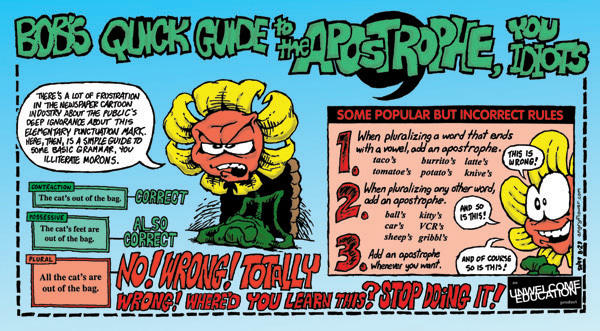
Posted on 09/28/2011 1:00:49 PM PDT by iowamark
Many brilliant people have some communication weak spots. Unfortunately, the reality is that written communication is a big part of business, and how you write reflects on you. Poor spelling and grammar can destroy a professional image in an instant.
Even if your job doesn't require much business writing, you'll still have emails to send and notes to write. And if you're looking for a job, your cover letters and resumes will likely mean the difference between getting the interview or not.
Bad grammar and spelling make a bad impression. Don't let yourself lose an opportunity over a simple spelling or grammar mistake.
Here are seven simple grammatical errors that I see consistently in emails, cover letters and resumes.
Tip: Make yourself a little card cheat sheet and keep it in your wallet for easy reference.
You're / Your
The apostrophe means it's a contraction of two words; "you're" is the short version of "you are" (the "a" is dropped), so if your sentence makes sense if you say "you are," then you're good to use you're. "Your" means it belongs to you, it's yours.
You're going to love your new job!
It's / Its
This one is confusing, because generally, in addition to being used in contractions, an apostrophe indicates ownership, as in "Dad's new car." But, "it's" is actually the short version of "it is" or "it has." "Its" with no apostrophe means belonging to it.
It's important to remember to bring your telephone and its extra battery.
They're / Their / There
"They're" is a contraction of "they are." "Their" means belonging to them. "There" refers to a place (notice that the word "here" is part of it, which is also a place – so if it says here and there, it's a place). There = a place
They're going to miss their teachers when they leave there.
Loose / Lose
These spellings really don't make much sense, so you just have to remember them. "Loose" is the opposite of tight, and rhymes with goose. "Lose" is the opposite of win, and rhymes with booze. (To show how unpredictable English is, compare another pair of words, "choose" and "chose," which are spelled the same except the initial sound, but pronounced differently. No wonder so many people get it wrong!)
I never thought I could lose so much weight; now my pants are all loose!
Lead / Led
Another common but glaring error. "Lead" means you're doing it in the present, and rhymes with deed. "Led" is the past tense of lead, and rhymes with sled. So you can "lead" your current organization, but you "led" the people in your previous job.
My goal is to lead this team to success, just as I led my past teams into winning award after award.
A lot / Alot / Allot
First the bad news: there is no such word as "alot." "A lot" refers to quantity, and "allot" means to distribute or parcel out.
There is a lot of confusion about this one, so I'm going to allot ten minutes to review these rules of grammar.
Between you and I
This one is widely misused, even by TV news anchors who should know better.
In English, we use a different pronoun depending on whether it's the subject or the object of the sentence: I/me, she/her, he/him, they/them. This becomes second nature for us and we rarely make mistakes with the glaring exception of when we have to choose between "you and I" or "you and me."
Grammar Girl does a far better job of explaining this than I, but suffice to say that "between you and I" is never correct, and although it is becoming more common, it's kind of like saying "him did a great job." It is glaringly incorrect.
The easy rule of thumb is to replace the "you and I" or "you and me" with either "we" or "us" and you'll quickly see which form is right. If "us" works, then use "you and me" and if "we" works, then use "you and I."
Between you and me (us), here are the secrets to how you and I (we) can learn to write better.
Master these common errors and you'll remove some of the mistakes and red flags that make you look like you have no idea how to speak.
“as I said, NOT “like I said”! There oughta be a law!
Think about it. Graph time on the x-axis, and degree of learning on the y-axis.
A skill which is quickly mastered has a steep learning curve.
A skill which is slowly developed over a long period of time would have a very shallow learning curve.
Which is exactly the reverse of the way most people use the phrase.....
What about...
“different from” and “different than”?
What about those and the usage?
“Don’t bother. “Like” is now used for “as.” (sigh)”
‘Twas ever thus...
http://www.youtube.com/watch?v=_9o5i9eNPhY
Was/were
Was is past tense, were is conditional in the singular and conditional and past tense in the plural.
When I was a boy...
If I were king...
They were my classmates...
If they were elected...
My favorite was “what I did” as a sort of verbal exclamation point. “What I did” could become “what I would,” or “what I will.”
“I got all the oil changed in that dozer; what I did.”
The t in often isn’t necessarily silent. It’s legitimately and correctly pronounced both ways.
Grammar checker
http://www.grammarly.com/?utm_source=ms&utm_medium=cpc&utm_content=txt&utm_campaign=ms_gram1
Just ahead of Martial/Marshal/Marshall Law.
My personal crusade is to remove the lazy term "email" from the English language (it's e-mail, the 'e' modifies the type of mail).
MARK (or is it Marc?)
You forgot about parking in the driveway and driving on the parkway. Don’t even mention hot water heaters......
I saw that one except spelled “ghoti” the o is pronounced as in women.
You just don’t grok the metaphor.
It’s not a simple graph over time, but a derivative function that describes the shortening in the length of an individual task with each successive iteration.
For the life of me I can’t figure out how to format equations here, so my poor English explanation will have to suffice. The more shallow the learning curve, the more uniform the progress from total unfamiliarity to maximum potential. Progress is steady, so there is very little curve. It’s a line from the bottom left to the top right.
A steep learning curve will show negligible initial gains at the start, and then curve dramatically towards the end to reach the top right. In exteme examples, it will graph out to an almost flat line through most of the graph that suddenly suddenly merges with what looks like the right half the letter U which takes it suddenly to the top right of the chart. A steep learning curve.
It’s not really a grammar mistake but the use of words that do not exist just pushes me over the top.
When I hear people on TV, especially educated people, use words like “co-conspirator” and “irregardless” I just wish to punch my TV and be done with it.

I used up all my exclamation points a couple of years ago. I was panic stricken!!
However, I was able to borrow a large supply from Pete Kessler at no charge. I'm still using them!!!
Thanks for coming to the rescue, Pete!!!!
Leni


Leave it to my wife to make the complicated simple. Othello’s motto of minutes to learn and a lifetime to master is an example of a shallow learning curve. Counting at the black jack table is a difficult learning curve that shows no real results short of mastery.
Come on buddy, get with the programmar...
What’s wrong with co-conspirator? It’s a legitimate word that’s been in use for 160 years.
Disclaimer: Opinions posted on Free Republic are those of the individual posters and do not necessarily represent the opinion of Free Republic or its management. All materials posted herein are protected by copyright law and the exemption for fair use of copyrighted works.